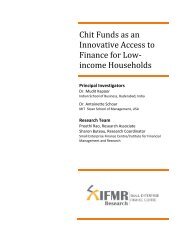Government of India Volume I: Analysis and Recommendations
Government of India Volume I: Analysis and Recommendations
Government of India Volume I: Analysis and Recommendations
Create successful ePaper yourself
Turn your PDF publications into a flip-book with our unique Google optimized e-Paper software.
RESOLUTION<br />
applicability <strong>of</strong> laws governing winding-up <strong>of</strong> companies <strong>and</strong> provides for its liquidation<br />
only by an order <strong>of</strong> the <strong>Government</strong>. These provisions create unfair competition as it<br />
creates a perception <strong>of</strong> safety in the minds <strong>of</strong> consumers <strong>and</strong> an expectation that they<br />
will be insulated from the failure <strong>of</strong> such firms. The Commission recommends that such<br />
provisions be amended immediately so that the resolution corporation can engage in orderly<br />
<strong>and</strong> least disruptive resolution <strong>of</strong> all covered service providers in accordance with<br />
its objectives envisaged in Table 7.2.<br />
In an attempt towards enhancing the effectiveness <strong>of</strong> the resolution framework, the<br />
Commission also focussed on the regulatory framework <strong>of</strong> co-operative societies that<br />
carry out banking activities. In the current arrangement, such “co-operative banks” are<br />
governed by state legislations <strong>and</strong> are subject to a dual regulatory framework by the RBI<br />
<strong>and</strong> the Registrars <strong>of</strong> Co-operative Societies <strong>of</strong> the States in which the banks are located.<br />
This has created difficulties in the regulation <strong>of</strong> co-operative banks. These difficulties<br />
have been attempted to be addressed through memor<strong>and</strong>ums <strong>of</strong> underst<strong>and</strong>ing entered<br />
into between the RBI <strong>and</strong> State <strong>Government</strong>s. Some States <strong>and</strong> Union Territories which<br />
have amended the local Co-operative Societies Act empowering the RBI to order the Registrar<br />
<strong>of</strong> Co-operative Societies <strong>of</strong> the State or Union Territory to wind up a co-operative<br />
bank or to supersede its committee <strong>of</strong> management <strong>and</strong> requiring the Registrar not to<br />
take any action regarding winding up, amalgamation or reconstruction <strong>of</strong> a co-operative<br />
bank without prior sanction in writing from the RBI are covered under the Deposit Insurance<br />
Scheme. These co-operative banks are designated as “eligible co-operative banks”<br />
for the purpose <strong>of</strong> deposit insurance under the DICGC Act, 1961. This has resulted in an<br />
uneven framework where some co-operative banks are eligible to avail the deposit insurance<br />
scheme by the DICGC while some others are not part <strong>of</strong> this arrangement.<br />
The Commission is <strong>of</strong> the view that when co-operative societies engage in the business<br />
<strong>of</strong> providing financial services, they need to be regulated <strong>and</strong> supervised by financial<br />
regulators in a manner that is commensurate with the nature <strong>of</strong> their business <strong>and</strong> the<br />
risks undertaken by them <strong>and</strong> must be resolved in an orderly manner to cause least disruption<br />
to the consumers <strong>and</strong> the financial system. Since co-operatives <strong>of</strong>ten cater to the<br />
needs <strong>of</strong> small households, the Commission is <strong>of</strong> the view that in the event <strong>of</strong> a deterioration<br />
in their risk pr<strong>of</strong>ile, they should be subject to the prompt resolution framework<br />
envisaged by the Commission.<br />
This can be achieved under Article 252 <strong>of</strong> the Constitution which allows two or more<br />
State Legislatures to pass a resolution accepting the authority <strong>of</strong> the Parliament to make<br />
laws for the State on any matter on which it otherwise does not have the capacity to legislate.<br />
Using this provision, State <strong>Government</strong>s could pass resolutions to extend the power<br />
to make laws on the regulation, supervision <strong>and</strong> resolution <strong>of</strong> co-operative societies carrying<br />
on financial services to the Parliament.<br />
The Commission therefore makes the following recommendations with respect to<br />
co-operative societies:<br />
1. In consonance with the recommendations on competitive neutrality, co-operative societies carrying<br />
on financial services should be subject to similar regulatory <strong>and</strong> supervisory framework <strong>of</strong><br />
resolution as other entities carrying on similar activities;<br />
2. Using Article 252 <strong>of</strong> the Constitution <strong>of</strong> <strong>India</strong>, State <strong>Government</strong>s should accept the authority <strong>of</strong><br />
the Parliament to legislate on matters relating to the failure resolution <strong>of</strong> co-operative societies<br />
carrying on financial services; <strong>and</strong><br />
3. The regulator may impose restrictions on the carrying on <strong>of</strong> financial services by co-operative<br />
societies from States whose <strong>Government</strong>s have not accepted the authority <strong>of</strong> the Parliament to<br />
legislate on the regulation <strong>of</strong> co-operatives. These restrictions would entail that co-operative<br />
societies in such states would not be covered under the resolution framework envisaged by the<br />
Commission.<br />
FINANCIAL SECTOR LEGISLATIVE REFORMS COMMISSION 77



